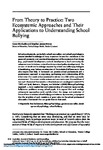From Theory to Practice: Two Ecosystemic Approaches and Their Applications to Understanding School Bullying
| dc.contributor.author | Mc Guckin, C | |
| dc.contributor.author | Minton, Stephen | |
| dc.date.accessioned | 2019-10-22T12:11:54Z | |
| dc.date.available | 2019-10-22T12:11:54Z | |
| dc.date.issued | 2014-06 | |
| dc.identifier.issn | 1037-2911 | |
| dc.identifier.issn | 1839-2520 | |
| dc.identifier.uri | http://hdl.handle.net/10026.1/15012 | |
| dc.description.abstract |
<jats:p>School professionals, particularly school counsellors and school psychologists, require detailed knowledge of many important factors that contribute to the personal, academic, and vocational development of the students in their charge (e.g., psychosocial development, curricula developments, local community developments and initiatives, national and international policy developments). The amount of detail and knowledge required by school counsellors/psychologists is bewildering, even before consideration of the individual differences in those who require their help. A framework can provide school professionals with a parsimonious approach to organising, synthesising and understanding all the information that needs to be considered in relation to a child within a particular environment. The current article reviews and comments upon the usefulness of two such theoretical frameworks — Bronfenbrenner's ecological model (1979, 1989) and Spiel, Reimann, Wagner, and Schober's (2008) Bildung-Psychology approach — to an exploration and understanding of a common issue; namely, bully/victim problems among school pupils. It is argued that such ecological/systemic approaches could usefully inform the design and evaluation of future efforts to address school bullying and violence. By extension, we propose that the simplicity of such models is of great value to the school professional who seeks a framework that can guide them in their work.</jats:p> | |
| dc.format.extent | 36-48 | |
| dc.language | en | |
| dc.language.iso | en | |
| dc.publisher | Cambridge University Press (CUP) | |
| dc.subject | Bronfenbrenner | |
| dc.subject | Bildung-Psychology | |
| dc.subject | guidance counsellor | |
| dc.subject | developmental psychology | |
| dc.subject | school bullying | |
| dc.title | From Theory to Practice: Two Ecosystemic Approaches and Their Applications to Understanding School Bullying | |
| dc.type | journal-article | |
| dc.type | Review | |
| dc.type | Journal | |
| plymouth.author-url | https://www.webofscience.com/api/gateway?GWVersion=2&SrcApp=PARTNER_APP&SrcAuth=LinksAMR&KeyUT=WOS:000337200900004&DestLinkType=FullRecord&DestApp=ALL_WOS&UsrCustomerID=11bb513d99f797142bcfeffcc58ea008 | |
| plymouth.issue | 1 | |
| plymouth.volume | 24 | |
| plymouth.publication-status | Published | |
| plymouth.journal | Australian Journal of Guidance and Counselling | |
| dc.identifier.doi | 10.1017/jgc.2013.10 | |
| plymouth.organisational-group | /Plymouth | |
| plymouth.organisational-group | /Plymouth/Faculty of Health | |
| plymouth.organisational-group | /Plymouth/Faculty of Health/School of Psychology | |
| plymouth.organisational-group | /Plymouth/REF 2021 Researchers by UoA | |
| plymouth.organisational-group | /Plymouth/REF 2021 Researchers by UoA/UoA04 Psychology, Psychiatry and Neuroscience | |
| plymouth.organisational-group | /Plymouth/Users by role | |
| plymouth.organisational-group | /Plymouth/Users by role/Academics | |
| dc.identifier.eissn | 1839-2520 | |
| dc.rights.embargoperiod | Not known | |
| rioxxterms.versionofrecord | 10.1017/jgc.2013.10 | |
| rioxxterms.licenseref.uri | http://www.rioxx.net/licenses/all-rights-reserved | |
| rioxxterms.type | Journal Article/Review |


